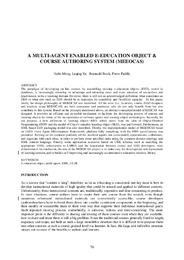| dc.contributor.author | Meng, Anbo | en |
| dc.contributor.author | Ye, Luqing | en |
| dc.contributor.author | Stock, Romuald | en |
| dc.contributor.author | Padilla, Pierre | en |
| dc.coverage.spatial | CY - Λευκωσία | en |
| dc.creator | Meng, Anbo | en |
| dc.creator | Ye, Luqing | en |
| dc.creator | Stock, Romuald | en |
| dc.creator | Padilla, Pierre | en |
| dc.date.accessioned | 2016-02-04T08:06:35Z | |
| dc.date.available | 2016-02-04T08:06:35Z | |
| dc.date.issued | 2005 | |
| dc.identifier.uri | http://hdl.handle.net/10797/14596 | en |
| dc.description | Περιέχει το πλήρες κείμενο | el |
| dc.description.abstract | The paradigm of developing on-line courses by assembling existing e-education objects (EEO), stored in databases, is increasingly revealing its advantage and attracting more and more attention of researchers and practitioners in the e-learning domain. However, there is still not an acknowledged definition: what constitutes an EEO or what size such an EEO should be to maximize its reusability and flexibility capacity. In this paper, firstly, the design philosophy of MEEOCAS was identified: All the roles (i.e., Learners, course /EEO designers and teachers using MEEOCAS) are both consumers and producers who do not only benefit from but also contribute to this system. Based on the principle mentioned above, an abstract conceptual model of EEOCAS was designed. It provides an efficient and powerful mechanism to facilitate the developing process of courses and learning objects by virtue of the incorporation of software agents and learning object technologies. Secondly, for our purpose, a new definition of learning object—EEO, which stems from the idea of Object-Oriented Programming (OOP) and the model of Cisco’s reusable learning object (RLO), was put forward. Furthermore, an XML based EEO packaging model was also described. Thirdly, the implementation model of MEEOCAS based on JADE (Java Agent DEvelopment Framework) platform fully complying with the FIPA specifications was presented. Relying on the common platform, all the involved agents can conveniently communicate, collaborate, and negotiate with each other, in order to perform some specified tasks using the common domain ontology and XML content language. Finally, some application scenarios based on UML schema, such as searching the appropriate EEOs, subscription to LMMA and the negotiation between course and EEO developers, were demonstrated. In conclusion, the aim of the MEEOCAS project is to make easy the development and deployment of learning contents and to build a self-improving and increasingly accumulated e-education resource library. | en |
| dc.language.iso | eng | en |
| dc.publisher | University of Zilina | en |
| dc.relation.ispartof | E-learning and distance learning | en |
| dc.rights | info:eu-repo/semantics/openAccess | en |
| dc.rights | Open Access | en |
| dc.source | CBLIS Conference Proceedings 2005 Integrating New Technologies in Science and Education | en |
| dc.title | A Multi-Agent Enabled E-Education Object & Course Authoring System (MEEOCAS) | en |
| dc.type | info:eu-repo/semantics/conferenceObject | en |
| dc.subject.uncontrolledterm | E-education object | en |
| dc.subject.uncontrolledterm | Multi-agent | en |
| dc.subject.uncontrolledterm | XML | en |
| dc.subject.uncontrolledterm | JADE | en |
| dc.contributor.conferenceorganizer | Learning in Science Group, University of Cyprus | en |
| dc.contributor.coordinator | Constantinou, Constantinos P. | en |
